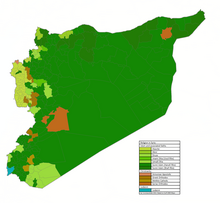
Back الأديان في سوريا Arabic الاديان فى سوريا ARZ Рэлігія ў Сірыі BE সিরিয়ায় ধর্ম Bengali/Bangla Religión en Siria Spanish דת בסוריה HE सीरिया में धर्म HI Agama di Suriah ID Religioni in Siria Italian რელიგია სირიაში KA
| Part of a series on the |
| Culture of Syria |
|---|
 |
| History |
| People |
| Languages |
| Cuisine |
| Religion |
| Art |
| Literature |
| Music |
| Sport |
Religion in Syria refers to the range of religions practiced by the citizens of Syria. Historically, the region has been a mosaic of diverse faiths with a range of different sects within each of these religious communities.

The majority of Syrians are Muslims, of which the Sunnis are the most numerous (formed mostly of Arabs, Kurds, Turkmens, and Circassians), followed by the Alawites and other Shia groups (particularly Isma'ilis and Twelver Shi’ism), and Druze.[2] In addition, there are several Christian minorities (including Greek Orthodox, Greek Catholics, Armenian Orthodox, Armenian Catholics, Syriac Orthodox, Syriac Catholics, Nestorians, Chaldeans, Maronites, Latin Catholics and Protestants).[3][4][5] There is also a small Yazidi community. In 2020, the Jewish Chronicle reported that there were no Jews left in Syria.[6]
- ^ "Syria". www.cia.gov. Archived from the original on 9 January 2021. Retrieved 28 January 2020.
- ^ Khalifa, Mustafa (2013), "The impossible partition of Syria", Arab Reform Initiative, archived from the original on 2016-10-09, retrieved 2018-08-02
- ^ Pierre, Beckouche (2017), "The Country Reports: Syria", Europe's Mediterranean Neighbourhood, Edward Elgar Publishing, p. 178, ISBN 978-1786431493,
Before 2011, Syria's population was 74% Sunni Muslim, including 500,000 Palestinians and non-Arab populations, that is Kurds (9-10%) and Turkmen (4%). Other Muslims, including Shias and Alawites (11% of the Syrian population)...Various Christian denominations made up 10%. There were a few Jewish communities in Aleppo and Damascus as well as 1500 people of Greek descent and small Armenians populations.
- ^ Drysdale, Alasdair; Hinnebusch, Raymond A. (1991), Syria and the Middle East Peace Process, Council on Foreign Relations, p. 222, ISBN 0876091052,
roughly 85 percent of all Syrians are Arabic-speaking and some 70 percent are Sunni Muslim, but these categories are not completely congruent and Arabic-speaking Sunni Muslims account for less than 60 percent of the total population. The religious and ethnic minorities that comprise 40 percent of Syria's population are diverse. Although nearly 90 percent of all Syrians are Muslim and almost all the rest are Christian, both communities are subdivided into many sects. Among the former, the main minorities are the Alawis (11.5 percent), Druzes (3 percent) and Isma'ilis (1.5 percent), all of whom are Arabic-speaking splinter Shiite groups. The largely Arab Christians are divided among a large number of denominations, with the Greek Orthodox the largest (4.7 percent). The main ethnic minorities, among whom Arabic is now widely used, are the Kurds (8.5 percent), Armenians (4 percent), Turcomans (3 percent), and Circassians (under 1 percent). Of these, all but the Christian Armenians are Sunni Muslim.
- ^ Van Dam, Nikolaos (1979), The Struggle for Power in Syria, Taylor & Francis, p. 1, ISBN 9780856647031
- ^ US State Dept 2022 report